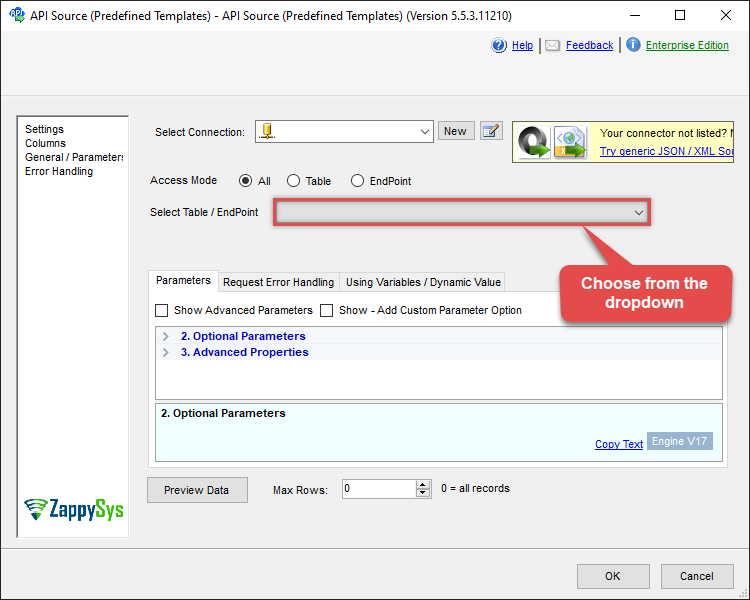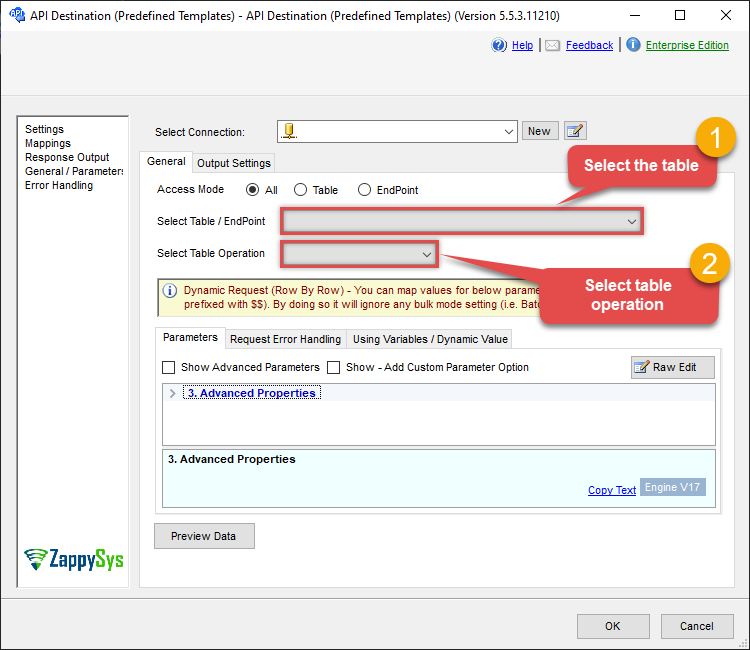Endpoint Delete Issue
Name
delete_issue
Description
Related Tables
Parameters
| Parameter | Required | Options |
|---|---|---|
|
Name:
Label: IssueIdOrKey Enter Issue ID or Key |
Output Columns
| Label | Data Type (SSIS) | Data Type (SQL) | Length | Description |
|---|---|---|---|---|
| Response |
DT_NTEXT
|
nvarchar(MAX)
|
Input Columns
| Label | Data Type (SSIS) | Data Type (SQL) | Length | Description |
|---|---|---|---|---|
| Id |
DT_WSTR
|
nvarchar(4000)
|
4000 |
Examples
SSIS
Use Jira Connector in API Source or in API Destination SSIS Data Flow components to read or write data.
API Source
| Optional Parameters | |
|---|---|
| IssueIdOrKey | |
| Continue On 404 Error (When record not found) | False |

API Destination
This Endpoint belongs to the Issues table, therefore it is better to use it, instead of accessing the endpoint directly. Use this table and table-operation pair to delete issue:
| Optional Parameters | |
|---|---|
| IssueIdOrKey | |
| Continue On 404 Error (When record not found) | False |

ODBC application
Use these SQL queries in your ODBC application data source:
DELETE Issue
Deletes a single issue
DELETE FROM Issues
WITH (IssueIdOrKey='10020', OUTPUT=1, ContinueOn404Error=0)DELETE multiple Issues matching with JQL search query
Delete multiple issues which match with certain condition (JQL). Adding Where 1=1 or some other WHERE condition invokes Lookup endpoint (refer to other example to learn about JQL - see Search issues using Advanced JQL query expression)
DELETE FROM Issues
Where 1=1
WITH (jql='status=done' , ContinueOn404Error=0)
--WITH (jql='key in(10001, 10002, 10003)' , ContinueOn404Error=0)
--WITH (jql='key in(CS-1, CS-2, CS-3)', ContinueOn404Error=0)
delete_issue endpoint belongs to
Issues
table(s), and can therefore be used via those table(s).
SQL Server
Use these SQL queries in SQL Server after you create a data source in Data Gateway:
DELETE Issue
Deletes a single issue
DECLARE @MyQuery NVARCHAR(MAX) = 'DELETE FROM Issues
WITH (IssueIdOrKey=''10020'', OUTPUT=1, ContinueOn404Error=0)';
EXEC (@MyQuery) AT [LS_TO_JIRA_IN_GATEWAY];DELETE multiple Issues matching with JQL search query
Delete multiple issues which match with certain condition (JQL). Adding Where 1=1 or some other WHERE condition invokes Lookup endpoint (refer to other example to learn about JQL - see Search issues using Advanced JQL query expression)
DECLARE @MyQuery NVARCHAR(MAX) = 'DELETE FROM Issues
Where 1=1
WITH (jql=''status=done'' , ContinueOn404Error=0)
--WITH (jql=''key in(10001, 10002, 10003)'' , ContinueOn404Error=0)
--WITH (jql=''key in(CS-1, CS-2, CS-3)'', ContinueOn404Error=0)';
EXEC (@MyQuery) AT [LS_TO_JIRA_IN_GATEWAY];
delete_issue endpoint belongs to
Issues
table(s), and can therefore be used via those table(s).
